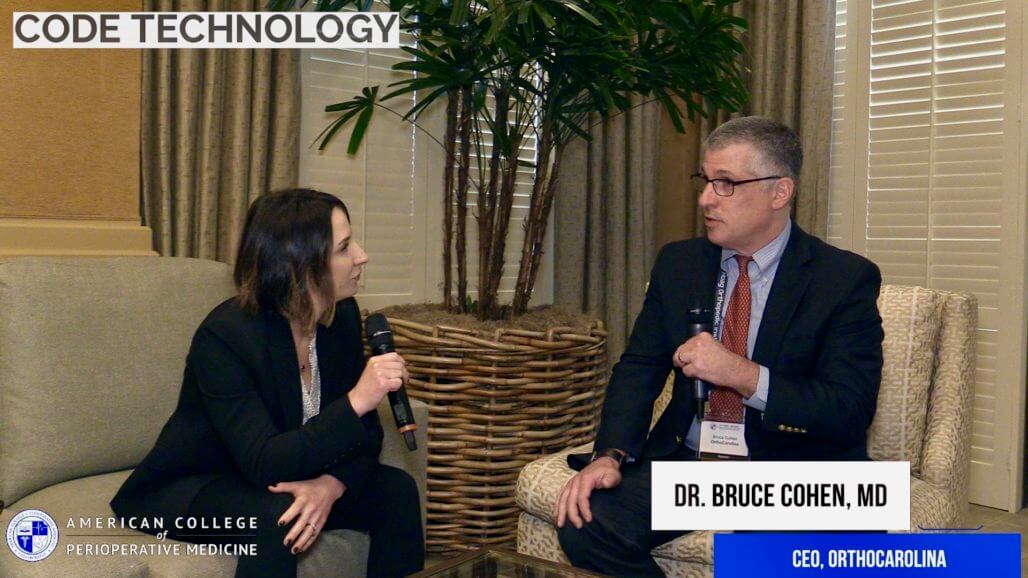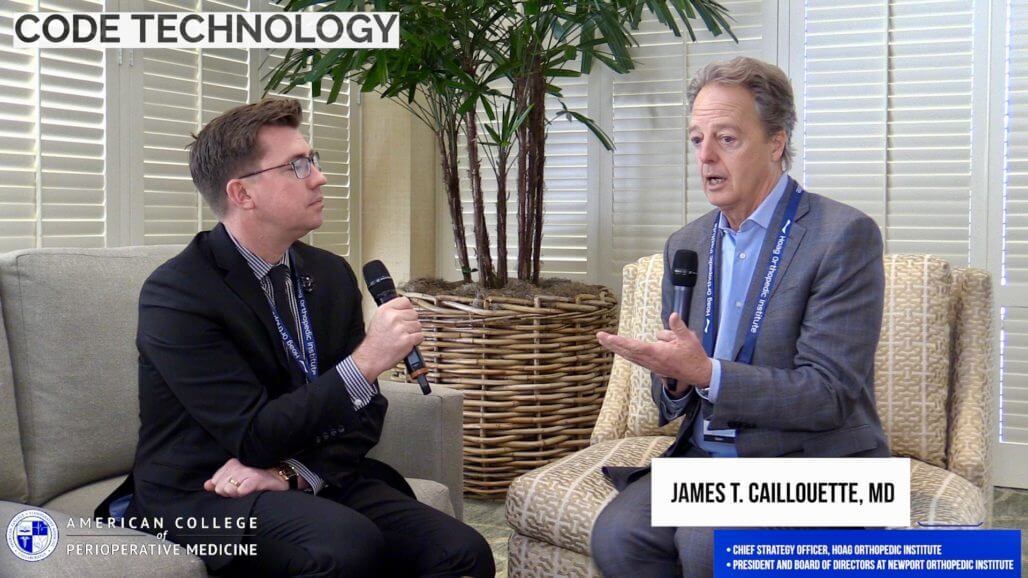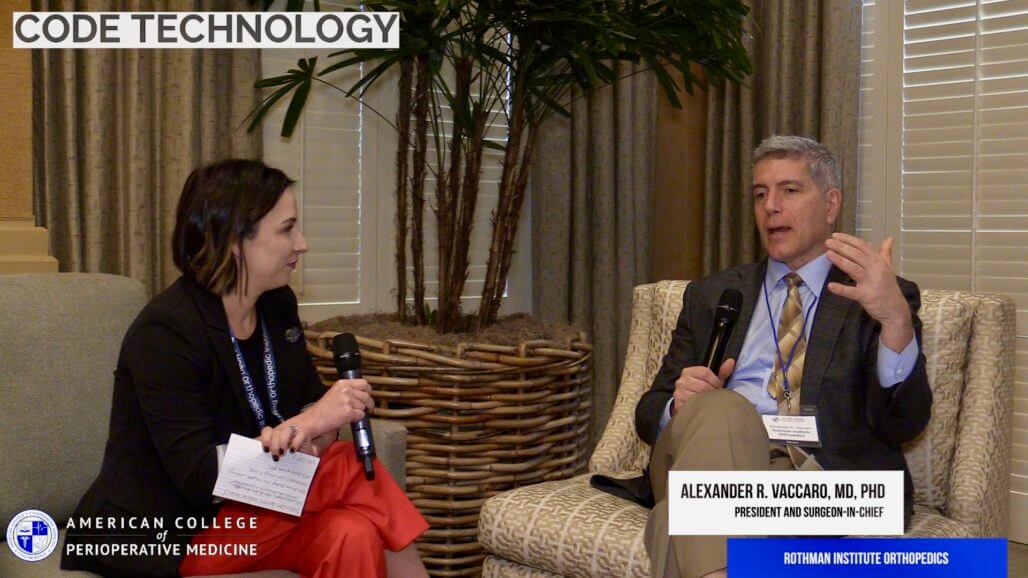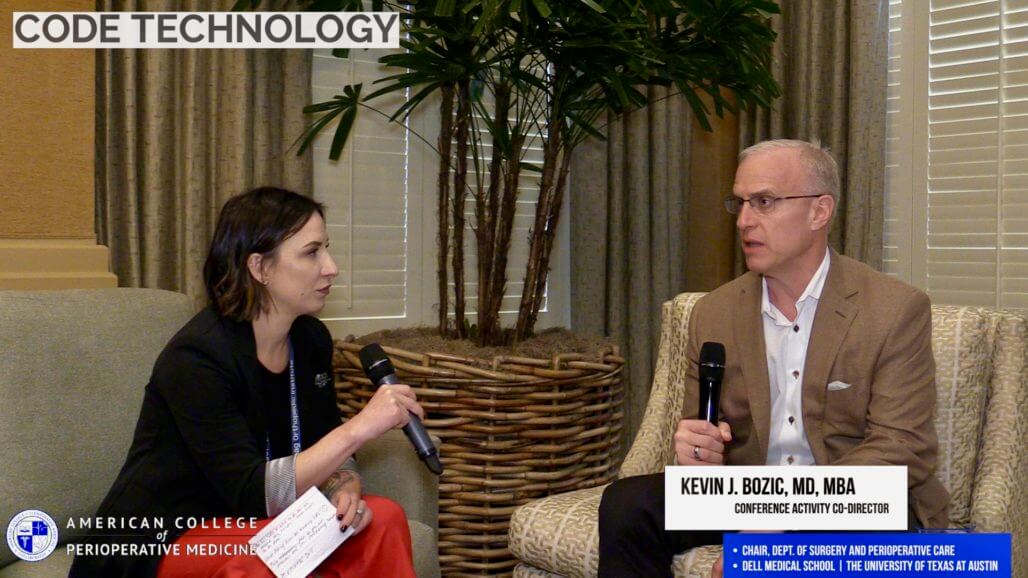Check out the full video interview with Dr. Cohen below
CODE speaking with Dr. Bruce Cohen, MD at the 4th Interdisciplinary Conference on Orthopedic Value Based Care 2020
Session Topics:
- The outpatient “evolution” in orthopedic surgery panel
- Changing rules and regulations affecting Orthopedic ASC
- OrthoCarolina Perspectives: Site of Care and Cost of Care: Where is the$?
Interviewee:
Dr. Bruce Cohen, MD
CEO for OrthoCarolina
Breanna Cunningham:
Hi there. This is Bre Cunningham with CODE Technology at the OVBC 2020 conference. I have the pleasure of interviewing Dr. Bruce Cohen on behalf of Dr. Kain at this great conference. Dr. Cohen, thank you so much for your time.
Dr. Bruce Cohen:
Sure. You’re welcome.
Breanna Cunningham:
So Dr. Cohen serves as the CEO of OrthoCarolina, which is a powerhouse group. Very privademic. They’re really, really productive from a research standpoint. He has been there for Nineteen (19) years, three (3) years as CEO and a foot and ankle surgeon. Do you still practice?
Dr. Bruce Cohen:
Yeah, I still practice. 50% of the time I’m clinical, the other 50% I’m administrative. But the reality is 100% administrative and I still practice 50% of my time.
Breanna Cunningham:
Okay, nice. Can you tell me a little bit about your journey from clinician to your role as a CEO?
Dr. Bruce Cohen:
Yeah, so it’s kind of a circuitous route. I have no formal training in business, so I never got an MBA. I really don’t want to, but I was always involved in the leadership of the group more on the operations side. We had some changes in our group, kind of spun off a company that my predecessor started, so we needed somebody to run OrthoCarolina, so he asked me to do it.
I said no the first two times and then finally agreed to do it. And so I was always in the leadership positions from the standpoint of physician governance, but not on the business side. So the switch to CEO really got me involved in the business part of it. I have 1800 employees that I have to manage. It’s a $300 million a year company that I’m running part-time basically, but I have a really good staff beneath me that really holds down the fort.
Breanna Cunningham:
What were the biggest surprises for you as it relates to that, understanding the financial side of things?
Dr. Bruce Cohen:
I think it was more dealing with the employees. As a physician, we’re sheltered in that. I never had to fire somebody before and never had to have a hard conversation with somebody. As the physician, you were seen as the leader of your own little group. But the reality is everything else was taken care of for you.
And so I deal a lot with the issues that the employees are facing, issues with the payers and negotiating insurance contracts, which I never thought I would ever get involved in Real estate transactions. Those things I really knew nothing about, but they’re really exciting.
Breanna Cunningham:
Now naturally you don’t learn any of this in residency or your fellowship, I assume?
Dr. Bruce Cohen:
Absolutely not.
Breanna Cunningham:
Is there something that you think should be embedded in the curriculum for residency or fellowship that would give surgeons just a little bit more insight into how the business side of things are?
Dr. Bruce Cohen:
Yeah, I think it’s critical. I’m not sure where it would be best served, whether it’s in medical school or in residency. But I lead a practice management curriculum for our residents, however it basically means I give six, seven talks a year, talk about contracts and some things like this. But I think more formal training is important because physicians are typically the worst, have the worst business minds. They haven’t been exposed to any of these things and they usually make fairly poor choices.
Breanna Cunningham:
That’s actually true.
Dr. Bruce Cohen:
Well that’s why-
Breanna Cunningham:
Historically if you look at it, if you ask any investment banker, they will say that.
Dr. Bruce Cohen:
Oh they would love to deal with physicians because they can usually get them to agree to anything. So I think some formal training in medical school is going to be critical. I think in residency training, especially in orthopedics because there’s so much involved that we’re going through right now. I think some more formalized training both on practice management, business relations and leadership I think is critical.
Breanna Cunningham:
Interesting. No, so you’re doing a lot of work at OrthoCarolina with value based care naturally and partnering with. You have your ASCs and there’s a lot of nuances that go into that. How are you in embedding a culture amongst your surgeons where they are one, learning about it and two, participating in these types of value based care realms?
Dr. Bruce Cohen:
It’s really hard. It’s been a slow transition but eventually the docs start buying in and we have to really change. We’re focusing on our organization and changing from what I call a provider-centric organization to a patient-centric organization that’s focusing on what’s best for the patient.
So the value based care programs that we talk about while there’s financial reasons to do it and the main reason to do it is better care for the patients. It’s a lower cost for the patient and the employees and the patients are really stressed financially. 18% of the GDP of the United States is spent on healthcare. We’ve got a broken system and it’s way too expensive and so we have to change something. And so the docs are coming around, not all of them but those who have embraced it have really embraced it.
Breanna Cunningham:
Yeah. Interesting. Now you talked about how the current policy, we’re not going to get into anti-kickback, I promise you that. But you did say that the current policy contradicts what we’re trying to do with value based healthcare. If you were to encourage young surgeon leaders to focus on one thing and what can they do to get active to help rescript the future?
Dr. Bruce Cohen:
Well, I think getting involved. Getting involved in your organization. So national organizations like the American Academy of Orthopedic Surgeons is very involved. Subspecialty societies, which I’m very involved with, are very involved in going to D.C. and changing these regulations.
These regulations, they weren’t bad regulations, but they were in the 70s and the 80s and healthcare was so different. So what we’re trying to do in healthcare right now, there are regulations that just don’t line up. So you need to get involved. You need to be a member of the Academy, you need to be part of your subspecialty society and your state society and all those things well.
Breanna Cunningham:
I love it. Is there any tip that you would give to young surgeons out there?
Dr. Bruce Cohen:
I think the biggest tip is we’re finding that people are making career decisions very early, too early.
Breanna Cunningham:
Like what?
Dr. Bruce Cohen:
They’re getting jobs in their third and fourth year residency.
Breanna Cunningham:
Oh. Okay, okay.
Dr. Bruce Cohen:
I think… You need to look around. Expose yourselves to as many opportunities as possible before you make a decision, and then once you make a decision, you need to be open to change because change is going to happen.
And so if they come in with their mind just set that they know exactly how their practice is going to be, they’re going to be very disappointed because change is happening to all of us every single day. And you have to learn how to accept it versus feel like it’s being done to you. You need to figure out how to adapt and how to be open to new ideas.
Breanna Cunningham:
I love it. Last question. What’s your favorite part about this conference?
Dr. Bruce Cohen:
Well, this is my first time here. I think it’s a fantastic conference. It’s a good mix of providers and administrators and business leaders and industry leaders. I think getting everybody at the table rather than our traditional, where somebody just talks to you and gives a didactic talk. I think getting everybody involved and on panels together is great.
Breanna Cunningham:
I love it. Well, thank you so much for your time today. We look forward to your talk tomorrow as well, and again, thank you.
Dr. Bruce Cohen:
Great. Thanks a lot.
Schedule A Call With a PRO Expert!
Need more help with your PRO related questions? CODE can help! Schedule a call with a CODE expert today to get you on your way to better harnessing your patient reported outcomes.




